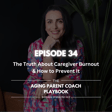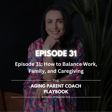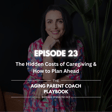
Episode 38: The Power of Self-Care for Caregivers: Why It’s Not Selfish, It’s Survival
If you’re caring for an aging parent, chances are you’ve put your own needs on the back burner. Between doctor appointments, medication schedules, and the constant emotional load, it’s easy to think, “I’ll take care of myself later.” But later often never comes.In this episode of The Aging Parent Playbook, Dr. Barbara Sparacino dives deep into why caregivers struggle with self-care, how to fit it into even the busiest day, and why it’s not selfish—it’s necessary. You’ll learn small, realistic steps you can take today to preserve your energy, your health, and your ability to care for the person you love.What You’ll Learn in This Episode:
• Why guilt keeps caregivers from prioritizing their own needs.
• Practical self-care strategies that actually work with a busy schedule.
• How to reframe self-care as essential for better caregiving.
• Small daily changes that make a big difference over time.Resources & Links Mentioned in This Episode:
• Visit The Aging Parent Coach for coaching and resources.
• Follow Barbara on Instagram: @theagingparentcoach
• Listen to more episodes of The Aging Parent Playbook.Listen Now:
Apple Podcasts | Spotify | Google Podcasts | Your Favorite Podcast App



















